#Frederick Coffin
Explore tagged Tumblr posts
Text
Actors whose names sound like pulp novel characters

(49) Frederick Coffin
2 notes
·
View notes
Text
Just finished House on Haunted Hill. Kinda goofy at times but a solid horror/thriller with some amazing shots like holy shit.
Also. Love Vincent Price and his wife Maddie.
#malu.text#house on haunted hill#my favorite is when Frederick Loren opens the little coffins and it's revealed there's a gun inside each one#plus Vincent Price and Carol Ohmart are amazing in it
1 note
·
View note
Text

HALLOWEEN ID PACK

NAMES︰ abraham. abraxas. adam. adrian. adrienne. alaric. alfred. alistair. amity. ann. annabelle. apple. arawn. ash. avaric. azazel. azrael. azriel. barnabas. belladonna. berry. blair. blaize. blake. blanche. boq. brain. bram. bridgette. bronwen. burton. candi. candy. caradoc. carmilla. carrie. casper. cassia. castor. choco. claire. clarice. claudia. cole. coraline. corbin. crimson. cuthbert. damien. damon. daphne. dark. debra. dexter. draco. dracula. drake. duncan. ebony. edgar. elena. eli. elphaba. elvira. ember. estelle. eve. eye. fable. fang. fergus. finn. fiyero. frankenstein. freddie. freddy.���frederick. george. ghost. ghoul. giles. glinda. griffin. grimm. gummy. hades. hallorann. hallow. hawthorne. heath. heathcliff. hecate. hekate. hela. hemlock. henry. ichabod. igor. ike. ivan. jack. jason. jasper. josette. knox. layla. lazarus. lenore. lester. licorice. lilith. lolly. lucinda. luella. luna. lunette. mab. malcolm. marnie. mary. matilda. mike. mikey. mina. morgan. morgana. mortimer. nancy. neoma. nessarose. nimue. norman. obsidian. onyx. orenda. orion. osiris. othello. pandora. payne. peach. perdita. poe. poison. pumpkin. radcliff. raven. reese. remus. renwick. requiem. rhiannon. romero. rosalie. rosemary. ross. ruby. rune. ruth. saber. sabrina. sage. salem. sally. sam. samhain. scarlett. sebastian. semyazza. seth. sibyl. sid. sirius. stella. stephen. sylvia. tabitha. thackery. trick. twila. twilight. udolpho. vamp. vampire. vanellope. vespera. victor. victoria. viktor. vincent. vlad. voltaire. wanda. wednesday. wendy. werewolf. wes. wesley. wilhelmina. willow. winifred. winter. wolf. wren. xander. zelda.

PRONOUNS︰ attic/attic. bat/bat. bell/bell. black/black. blood/blood. bone/bone. boo/boo. cabre/macabre. candle/candle. candy/bar. candy/candy. candybar/candybar. carve/carve. cavity/cavity. cem/cemetery. chaos/chaos. choco/chocola. claw/claw. co/coffin. costume/costume. crim/crimson. cry/crypt. dark/dark. darkroom/darkroom. demon/demon. devil/devil. dread/dreadful. end/ender. eve/eve. fair/fair. fang/fang. fest/festival. flick/flick. ghost/ghost. ghoul/ghoul. grem/gremlin. grim/grim. grue/gruesome. hallo/ween. hallow/hallow. hallow/halloween. halloween/halloween. haunt/haunt. haunted/haunted. hay/hayride. hex/hex. hide/hide. howl/howl. imp/imp. mis/mischeif. mon/monster. monster/monster. myst/mystery. para/normal. poi/poison. poison/poison. polter/geist. prank/prank. pum/pumpkin. pump/kin. pump/pumpkin. pumpkin/pumpkin. scare/crow. scream/scream. shriek/shriek. skel/skeleton. skeleton/skeleton. skull/skull. so/soul. spider/spider. spirit/spirit. spook/spook. spooky/spooky. static/static. sweet/sweet. tale/tale. thrill/thriller. tomb/tomb. treat/treat. tri/trick. trick/treat. trick/trick. trickster/trickster. vamp/vamp. vamp/vampire. vampire/vampire. venom/venom. voi/void. web/web. werewolf/werewolf. witch/witch. wolf/wolf. zomb/zomb. zombie/zombie. ⚰️. 🍁. 🍂. 🍫. 🍬. 🍭. 🎃. 👻. 💀. 💚. 💜. 🕯. 🕷. 🕷️. 🕸. 🖤. 🦇. 🦴. 🧡.

#pupsmail︰id packs#id pack#npt#nput#name suggestions#name ideas#name list#pronoun suggestions#pronoun ideas#neopronouns#emojiself#nounself
77 notes
·
View notes
Text


the presence of their shared gremlin seemed to make austen change his mind about nia though? once frederick was off to sleep their bickering evolved into... something else.
nia: oh so you think you can handle it now? i bet you wouldn't even wanna bang in my coffin austen: ha! i have no natural survival instinct so this is fine actually
#he hated her im crying the switch up. hes into milfs i guess#the sims#sims 4#ts4#ts4 gameplay#ts4 vampires#austen#nia#wellbelove
37 notes
·
View notes
Note
I just KNOW that Frederick the Great is tweaking in his coffin right now with the victory of the rotten orange.
It's jover for all of us in politics 💀, we need a hero (historical political figure from Prussia who happens to be gay)
Oh no we do NOT need a comeback no thank you nuh huh not agreeing with this he better stay dead 🚩🚩🚩
All jokes aside!
I think we need to talk about this statement you made. I'm european, that means I'm not directly affected by Tr*mp's election, but I will be in the near future considering most politicians in my country love to lick fascist boots (not surprised, they're fascists themselves). This is a premise to say that we are collectively sinking deep in a pile of shit, but that I'm also used to fascist ideology comfortably sitting in Parliament chairs as I am used to anachronistic statements, so here's my two cents about what you just said.
I admit I have no idea if by "tweaking" you mean tweaking with joy or tweaking in horror, I've seen the verb being used in both contexts and English isn't my first language, but this doesn't matter. Whatever you meant, I wouldn't make a statement like this one to talk about the current situation, if I were you. Now, I know you were probably joking and that's fine, but I still feel like it is my responsibility to answer back to you with what I think about this, especially with what is happening right now: we need to stop thinking about historical figures with our 21st century mindset, ESPECIALLY when it comes to political matters like, for example, segregated and oppressed communities' basic human rights.
Especially when talking about queer historical figures such as Frederick, considering the time he was born, lived and died, he wouldn't even know what the word "gay" means. He wouldn't use the word "homosexual", he wouldn't know how to label himself, he wouldn't think like we do because we're talking about an 18th century rich white man. And he probably wouldn't align with any feminist ideology, as wouldn't most (if not every, but I'm not educated enough to speak on behalf of historical feminism) male figures from his time period. When thinking about it, being considerate enough towards oppressed communities as to, for example, not use certain slurs is a fairly new thing. The words used to describe a gay man back then would be considered extremely offensive right now – not to mention being a lesbian was equated with being mentally ill.
To mix historical figures and modern day society is anachronistic and aside from not leading us anywhere it can be extremely dangerous. What you said was innocent, I think, so I'm not accusing you of anything, and while anachronism can sometimes be funny (like, for example, a meme or a drawing) when dragged into modern society's ideology, it becomes a double-edged sword. Especially when it comes to Frederick. Idolizing him lead to some very bad stuff. N*zis glorified him as a hero and a great German leader prefiguring H*tler. Joseph G*ebbels commissioned artists to render fanciful images of Frederick, Bismarck, and H*itler together to create a sense of historical continuum amongst them and legitimise the Regime by doing so. To this day there are people who proudly call themselves "Prussian nationalists" which in the year of our lord 2024 is rather pathetic (wake up, Prussia doesn't exist anymore, guys) and deeply concerning. These people have reached out to me in the past and I ever so quickly blocked them.
When it comes to a drawing, something silly, something done lightheartedly, it is one thing. When people (not just me, people) draw modern AUs with historical figures just to have fun, with nothing problematic attached to it, that's just what it is: a drawing. But when it comes to politics let's remember that these people are dead, have been dead, and better stay dead and the fuck out of Parliament seats, politicians' mouths, and human rights movements because most of the time they wouldn't even know what the hell we're on about. And that is okay. They have done their time on Earth and we can study them, like them, make content revolving around them like I do along with many other people, but what we cannot do is use them to say they'd stand by us and agree with us because that takes us nowhere.
I'd like to end this by saying I'm not attacking you, and if you feel like I am or would like to talk about this further feel free to DM me. This is just a general message to everyone to not come to me with anachronistic takes, be they voluntary or involuntary, because I'm way too used to them not to start being really annoying.
#answers#it took me a while to answer to you but saying this is crucial#i'm sure what you said was lighthearted again not accusing you of anything#i don't know you and i'm in no position to assume what you meant by this#but please note that anachronism can be real dangerous#i don't have an history degree so this isn't that thorough#if someone wants to add something my ask box is there for you and i would really appreciate
12 notes
·
View notes
Text
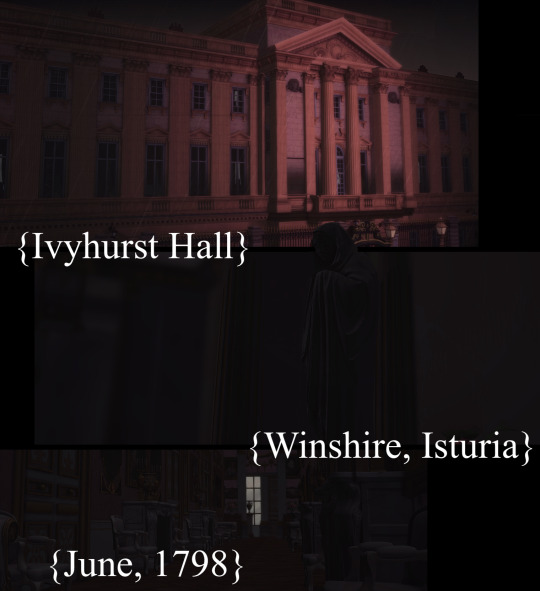
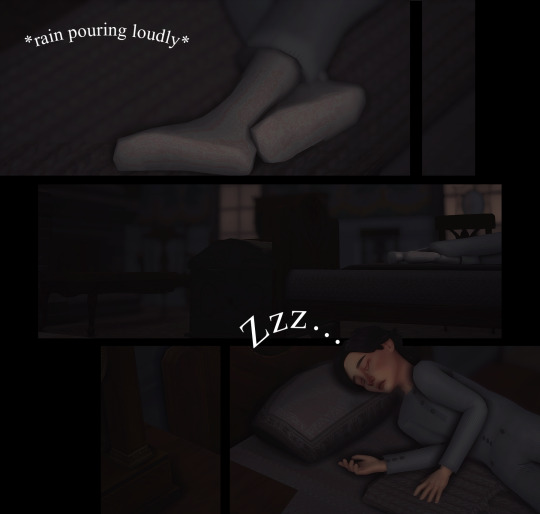
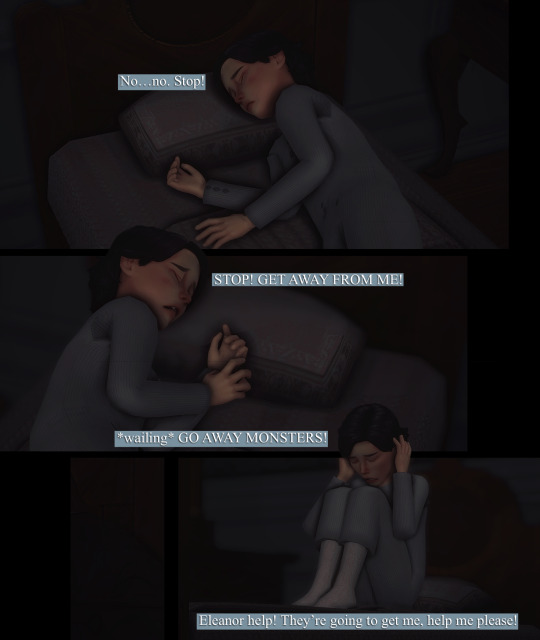


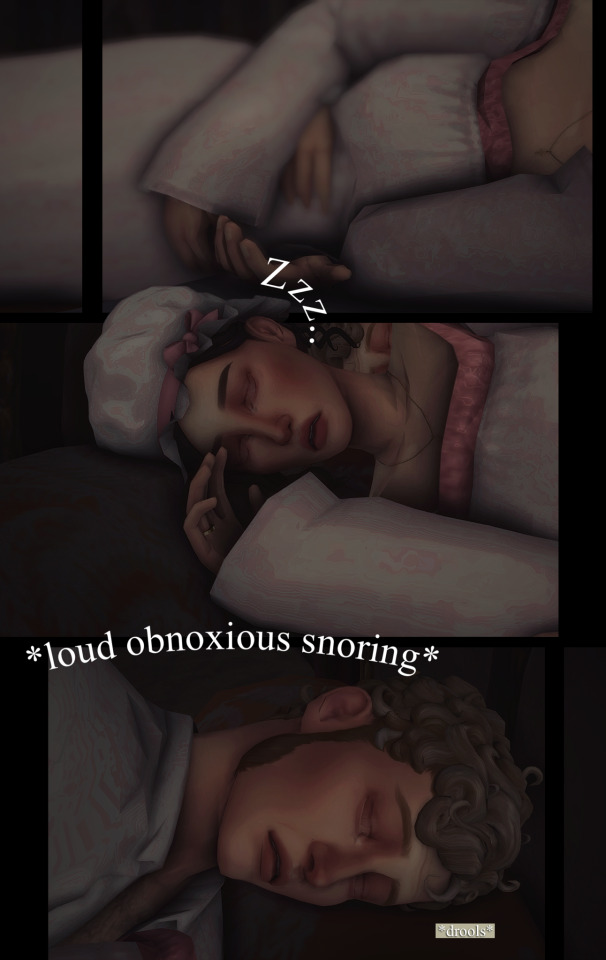
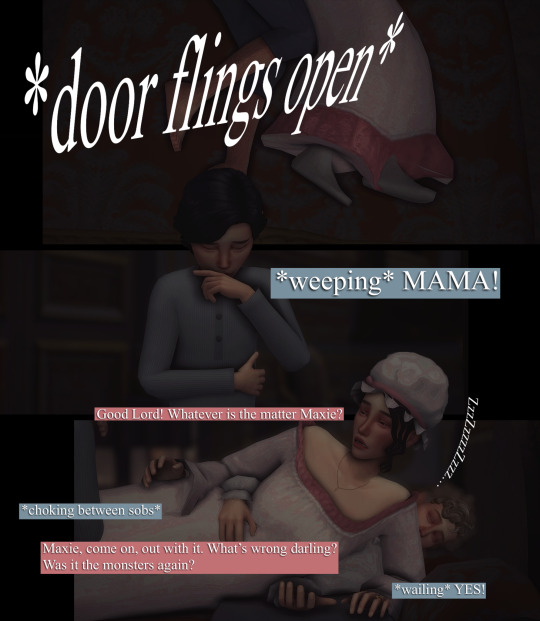
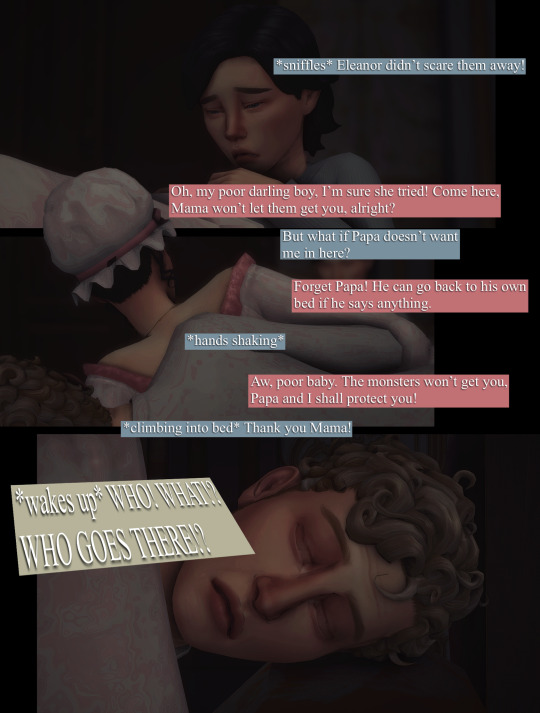
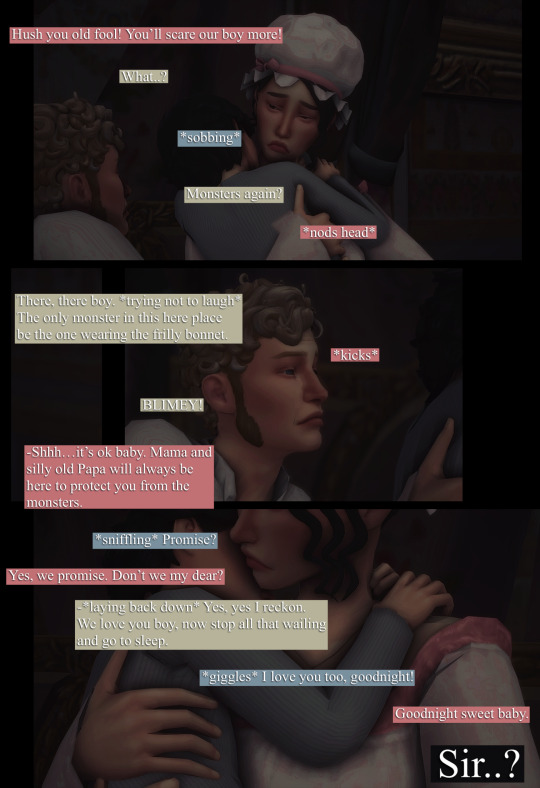
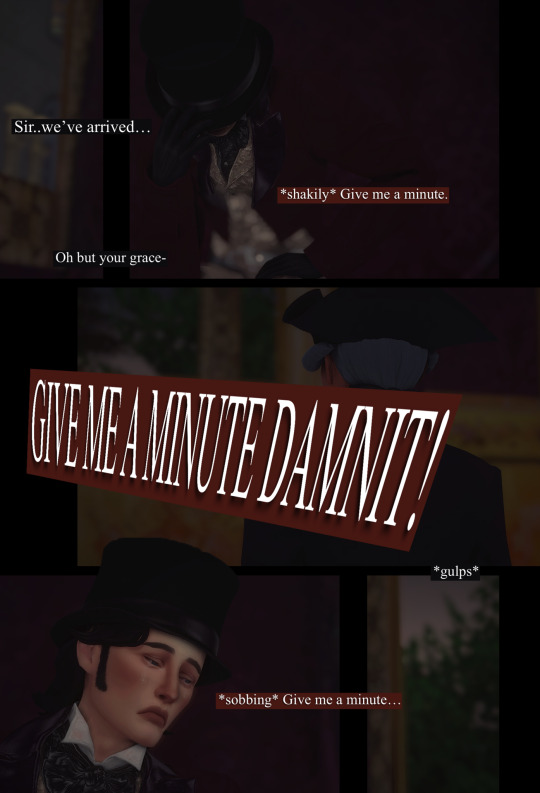

A letter from Maximilian Worthington to Frederick Worthington:
July 8th, 1817
Often, I am haunted by the fear of judgment for expressing my emotions so freely, save for you alone am I truly able to confide in. Today was extremely hard for me because it would’ve been Mama’s fiftieth birthday. I remember her death so clearly in the back of my mind, just as if it were yesterday. I returned from my daily ride, shortly before the usual dinner. I picked Mama a handful of daisies hoping to lift her spirit as she had been so melancholy with the loss of my dear sister the year prior. I hastily walked up to her chamber, knocked, and received no answer. Knocking once more and still hearing nothing, I entered the room, only to find her lifeless body limp and sprawled across the bed. I screamed for Father, who rushed from his study, and upon seeing his dear wife, collapsed and was immediately consumed by tears. His scream was heard all over Ivyhurst, as Isabella came immediately from the drawing room. We were all overtaken by grief, and sprawled on the floor in our despair. Miss Hurst, Bell’s governess, gently took the poor desolate girl away from the scene. I attempted to console my dear Father and it seemed my mind had gone blank. I don’t know how long I sat there with him weeping into my arms, perhaps it was an hour or two because when I looked out the window the sky was pitch black. Papa refused for anyone to come near her body, and told Reverend Smith to be damned to the depths of hell. When the funeral furnisher and undertaker finally arrived, he could not part with the corpse of his beloved Phia and therefore attacked both men who tried to get her. Because of this, he was given one last night alone with her, and he didn’t sleep. He held her in his arms and wept into her bosom the whole night, begging God to do the irreversible and take him instead. He said it wasn’t right that a man's sweet little daughter and now his beloved wife must go before him. I sat with Bell the whole night who cried herself to sleep in my arms. I didn’t sleep and had no more tears to cry, so I just sat there with my right leg joining my heart in numbness. At the crack of dawn, Father called us to embrace Mama’s lips and say a last farewell. I knew this kiss would be the last I should ever bestow upon on the woman who held all my affection. In the evening, she lay in the chapel with all the servants and the few people she held dearest to her heart around her coffin. The only person missing was you, as Papa blamed the entirety of your household for her demise, thus you were forbidden from coming. The daisies I picked for her were placed into her hands, and that was my final gift to my mother. She was taken to Thornfield before nightfall, to be reunited with the vessel of her daughter just as her spirit had been. Papa refused to watch her be put into a grave as he said he would jump into it with her, and Bell and I knew our hearts couldn’t handle that same sighting we saw less than a year ago with the death of our Elle. I watched the hearse head for the gates, and before it left, I kept telling myself that it was a nightmare. I hoped it would return with haste and bring back my nurturer, my savior, my most cherished Mama-but it never did.
#sims 4 regency#sims 4 regency era#sims 4 historical story#regency ts4#regency sims 4#ts4 regency#historical sims 4#sims 4 historical#historical sims#tcotd
39 notes
·
View notes
Text
‘A Beacon of Hope’: Indigenous People Reunited With Sacred Cloak In Brazil
Denmark Sends 300-Year-Old Feathered Cloak Considered An Ancestor By Tupinambá de Olivença to Rio
— Tiago Rogero | Rio de Janeiro, Brazil 🇧🇷 | Thursday 12 September 2024

The Cloak will be Publicly Unveiled at a Ceremony on Thursday. Photograph: Niels Erik Jehrbo/Nationalmuseet
The scene resembled a funeral: seven Indigenous people, overcome with tears, gathered around a loved one resting in a coffin-like wooden box. Instead of grief, however, it was a moment of celebration: the long-awaited reunion between the Tupinambá de Olivença people and a sacred feathered cloak that was taken from Brazil at least 335 years ago.
The relic – which the Indigenous people consider not as an object but as an ancestor – had been at Denmark’s National Museum until July, when it was sent to Rio de Janeiro.

Chief Jamopoty and six other Representatives of the Tupinambá de Olivença people reunited for the first time with the cloak taken from Brazil at least 335 years ago. Photograph: Tiago Rogero/The Guardian
It will be publicly unveiled at a ceremony at Brazil’s National Museum on Thursday attended by President Luiz Inácio Lula da Silva. But the first private encounter between the Tupinambá of Olivença and the cloak took place on Sunday, in an intimate moment witnessed by the Guardian.
The reunion had been eagerly anticipated: after the cloak’s return to Brazil, the Indigenous group had complained that they were not initially given the chance to perform their reception rituals for the sacred relic, which they refer to in the same terms they would to a person.
“We spoke to him, and he responded,” said Cacique Maria Valdelice Amaral de Jesus, 62, known as Jamopoty Tupinambá.

About 200 Tupinambá de Olivença made the 1,250km journey from their land in Bahia to Rio de Janeiro and have been camping near the National Museum. Photograph: Tiago Rogero/The Guardian
Jamopoty said the cape had returned to resolve the numerous land disputes threatening Indigenous communities across Brazil, adding: “He said we must have our lands demarcated.”
She was joined in the temperature-controlled room by six other representatives of the Tupinambá de Olivença, who for about 20 minutes prayed and spoke to the cloak, which lay under an oxygen-free glass dome, as technicians carefully monitored the humidity.
Jamopoty’s remarks were recorded by the documentary director Carina Bini who, with the Indigenous leader’s consent, shared them with the Guardian.
“You’re lying down, but you’ll stand up. We came to visit you,” she said.
“I don’t even have words. It’s the most beautiful thing I have ever seen,” she said as tears ran down her face, which was painted with the red dye of annatto seeds.
Her partner, Averaldo Rosario Santos, told the cloak that its return was “a beacon of hope for all the Indigenous peoples that remain in this once-invaded Brazil.”

Maria Valdelice Amaral de Jesus, 62, known as Jamopoty Tupinambá. Photograph: Tiago Rogero/The Guardian
Tupinambá cloaks – typically made from thousands of scarlet ibis feathers – were used as ceremonial vestments by coastal Indigenous peoples, said Amy Buono, an assistant professor of art history at Chapman University.
“These capes probably functioned as supernatural skins, transferring the vital force from one living organism to another,” said Buono, who has studied this cloak and 10 others still in European museums in Denmark, Italy, France, Belgium and Switzerland.
“Tupinambá capes were some of the most sought-after artefacts in the early 16th century,” she said. Several Tupinambá cloaks were worn by the courtiers during a 1599 procession at the court of the Duke of Württemberg in Stuttgart.
The newly returned cloak was first inventoried by Denmark in 1689 as part of the collection of Frederick III, possibly after it was taken from Brazil by Dutch forces, which occupied the state of Pernambuco from 1630 to 1654.
“When the cloak was taken from us, it weakened our community,” said Jamopoty.

A Parade in Stuttgart at the Court of Duke Frederick I of Wurttemberg in 1599. Photograph: Album/Alamy
The Tupinambá de Olivença’s fight for the cloak’s repatriation began in 2000 when it was loaned for an exhibition in São Paulo. Jamopoty’s mother, Nivalda Amaral de Jesus, who was known as Amotara, visited the exhibit and demanded its return to Brazil.
At the time, the Tupinambá were not even officially recognised as an Indigenous people – they were even described as extinct in history books.
Under pressure from Amotara (who died in 2018) and other leaders, the Tupinambá de Olivença were finally recognised in 2001 by the Brazilian government.
Eight years later, the first step was taken towards demarcating their territory – an area of 47,000 hectares spanning three municipalities in Bahia.
Since then, however, the Brazilian government has made no further progress in mapping their territory, which has led to land grabs by cocoa farmers and tourism developers.

Indigenous Leaders Frustrated Despite Cloak’s Return to Brazil after 300 Years! Denmark returns artefact but Tupinambá leaders say they were prevented from performing the necessary rituals to receive sacred relic. Cloak is made with about 4,000 Red Feathers of the Scarlet Ibis Bird was first inventoried by Denmark in 1689, but some believe it was taken from Brazil nearly 50 years before. Photograph: Niels Erik Jehrbo/Nationalmuseet

‘We Wanted To Perform Our Rituals, With Songs and Incense Using Our Herbs … It would have been a Special Moment for Strengthening Our Identity,’ said the Chief of Tupinambá de Olivença People. Photograph: Niels Erik Jehrbo/Nationalmuseet
About 200 Tupinambá de Olivença made the 1,250km journey to Rio to receive the cloak, camping near the National Museum, which is still being rebuilt after a huge fire destroyed about 85% of its collection in 2018.
The museum’s director, Alexandre Keller, said the cloak would go on display to the public when the museum reopens in April 2026. Until then, it will be available only to researchers and Indigenous people.
There is no indication that any other Tupinambá cloak will be repatriated but Buono argued that they should all return to Brazil: “These capes were collected by Europeans to be displayed as curiosities and studied for their materials.
“But for the Tupinambá these were, and continue to be, sacred, living forces. Their presence in Brazil will be an extremely important marker of communal identity and evidence for land rights and other legal matters,” she said.
#Indigenous Peoples#Brazil 🇧🇷#Rio de Janeiro#Americas#Luiz Inácio Lula da Silva#Denmark 🇩🇰#Features#Sacred Cloak#‘A Beacon of Hope’#300-Year-Old Feathered Cloak#Ancestor | Tupinambá de Olivença | Rio#The Guardian USA 🇺🇸
11 notes
·
View notes
Text
So I've seen some debate on this, and I get why. There are absolutely people who use the nickname "Annie" for Annabeth purely condescendingly. The "ie" diminutive at the end there does a lot of lifting that "Beth" doesn't, since we tend to associate the -ie / -y sound with childhood.
HOWEVER.
I do actually like the nickname "Annie" for Annabeth... Just only in very specific cases and from very specific people.
Thalia and Luke called her Annie because she was a literal small child they were caring for. It was affectionate, in the same way Thalia might have called Jason "Jace" or "Jay".
Thalia still gets away with calling Annabeth Annie, but when she first wakes up in SOM it's too jarring. There's also Annabeth not wanting the nickname to spread. So after TTC, Annabeth is "Annie" when they're in private and Thalia is feeling soft OR when Thalia is emotionally charged and it overrides her brain to mouth filter.
Luke called her that for the first few years at Camp, but it faded out overtime because he was the only one using it. Annabeth sucker punching Connor Stoll for teasing her about it definitely did not help, but Luke's failed quest was kind of the nail in the coffin.
Grover COULD technically call her that, and he did a little when they were on the run, but he never really did it after they got to Camp. She would be weirded out if he started now
Chiron COULD call Annabeth that and she wouldn't say anything, but he probably never WOULD.
As for the list of people who cannot call her Annie under pain of death... We have pretty much the rest of the Camp, including Percy. 'Annie' is an affectionate name from those who have been 'in charge' of her somehow, and Percy is her equal. It would sound weird.
Special mentions on the 'don't' list though:
Connor Stoll. He used it extensively for a few days because he thought it was funny she was annoyed. He didnt exactly realize how MUCH she didn't like it, despite Luke trying to tell him to knock it off, until she absolutely lost her shit and decked him. He is now one of the first to advocate for the 'leave Annabeth's name alone' rule with New Campers.
Annabeth's older Athena siblings didn't get to share the nickname because she was afraid of being 'disloyal' to Thalia's memory at first and then it stuck that way.
Clarisse had toyed with the idea of mocking Annabeth with the nickname for a while but hadn't had the opportunity to do it out of earshot of Luke or Annabeth's siblings. Then she witnessed the fight with Connor and that made her take Annabeth seriously. (Also increased her respect for Annabeth )
Frederick Chase is never, ever, ever allowed to call his daughter Annie or any other diminutive. It's too contradictory for Annabeth, and it would collectively piss off anyone who ACTUALLY took care of her as a small child. This goes double for his wife.
15 notes
·
View notes
Text
OC Character intro~
Thank you @drchenquill !!
I plan on posting an official intro for this guy soon enough, but this is a good trial run/first look for that!
Name: Tristan Learmont
Nickname: Had no familial nicknames. Crispin calls him "the fop" before getting to know him better (fop being an old word for a dandy). The demon sometimes calls him "puppy" in reference to his young age and, at the time, another word for a dandy/effeminate male.
Kind of being: Human. Some distant fairy ancestry (he's unaware of this).
Age: 12
Sex: Assigned male at birth. Definitely not cis. If he lived in modern times he might call himself trans or nonbinary.
Appearance: Thin and frail-looking. Very, very pale from lack of sunlight. Dark circles under his eyes from poor health and disinterest in sleeping much. Icy blue eyes. His hair is so dark brown it looks black, and is slightly wavy. The longest part of his hair brushes his shoulders. It's basically a historic shag/mullet. A rather prominent and pointy nose. A slight under-bite which is noticeable from his lower lip protruding further than his upper lip, making it look like he's pouting all the time.
Occupation: Nothing since he's a kid! I guess technically you could say he's working for the demon.
Family Members: His parents are Loftus Learmont and Cassandra Learmont (maiden name Coffin). They are landed gentry, and very wealthy. Loftus is Scottish in ancestry, but they live in England. Tristan also has 12 older siblings. From oldest to youngest, they are: Anquetil, Frederick, Julietta, Lorin, Evelina, Matilda, Florentia, Theodosia, Menander, Presley, Harcourt, and Lenore. Tristan is the only child younger than Lenore.
Pets: None. He wasn't allowed any growing up.
Best Friends: Crispin, who is also his only friend. They don't really become friends till well into the story though.
Describe his room: When he was living at home, his room was large, with high ceilings. There was a large fireplace, and a huge four poster bed with an even huger canopy. There were also tall windows with deep casements, in the fashion of the day, but these were always shut tight and often covered with heavy drapes. The room was lit primarily by oil, candles, and the fire. It was often shadowy and gloomy. But still the walls were papered beautifully, the drapery on the bed and windows was of the finest material, the bed was furnished with the finest quality linens, and the floor was covered in an expensive rug. There was a table and chair of polished wood where Tristan did his lessons, writing, and sometimes his reading. When he was little the floor was strewn with an exorbitant amount of toys, and later the floor was strewn with books, sheets of paper with writing on them, and various contraptions. Any clean-up of this by the servants was quickly undone as soon as they left the room. The walls were covered in portraits, all of them of Tristan at different ages.
Way of Speaking: He speaks softly, and his voice sounds sweet even as he's saying something awful or mean. It has a frail sound to it, as if he can't speak any louder, but this is partially an act. He can be ear-splittingly loud when he wants to be. His voice is also very nasally, which adds to its shrillness when he raises his volume. He speaks in an overly formal, literary sort of way, as he's read far more books than he's had social interaction. He has the accent of an upper-class English person of the early 1800s. This is quite different from the modern upper class English accent.
Physical Characteristics (Posture, Gestures, Attitude): Holds himself rather languidly, like he's slightly bored by everything. This is partially because of actual fatigue due to illness. Leans a lot on things and sits on things that aren't meant to be lounged on/in (windowsills, tables, the nook of a bent tree trunk). When he's arrested by passion for something he seems possessed by a manic energy and perks up significantly. He has a gliding, elegant way of movement. If not for the awkwardness of being 12 it would verge on graceful.
Items in his Back Pocket/Purse: He keeps an enchanted pocket watch given to him by the demon on his person at all times. It tells him how much time he has left to fulfill the tasks the demon gave to him. He also keeps scented water to perfume himself with, and a handkerchief to cough into. He also keeps some medicines with him, or what passed for medicines at the time (they're probably actively making him worse). He keeps these things in his pockets if he's wearing boy clothes, and carries a reticule if he's wearing girl garb.
Hobbies: Reading is a big one, and so is dabbling in the occult. He went through a long phase of trying his own scientific experiments, and even building simple machines. He adores fashion, and enjoys writing, whether that be in his diary or short stories. He also loves dancing, and singing too. Once he runs away from home, he loves exploring nature.
Favourite Sports: He wasn't allowed to engage in physical activity growing up due to his medical issues, so he's never really played any. He doesn't have a huge interest in it, though. He really would love to ride horses, and to hunt. He would love to shoot a gun.
Abilities/Talents/Powers: He's very smart for his age, and has a higher-than-average propensity for retaining information he learned from books. Has some natural knack for doing magic, and somewhat of a sixth sense (he's seen/sensed spirits his whole life). Quite talented at writing and being creative in general. Naturally good at dancing.
Relationships (How they are with other people): He was raised with a mixture of emotional neglect, isolation, and being spoiled rotten and never disciplined for bad behavior, so he's uh. A Lot. He has no idea how to be considerate and show care for another person, and he doesn't see a reason to do so either. He's annoying, invasive, rude, condescending, selfish and cruel towards others. Even if he likes someone, he still sees them as a toy or pawn to get what he wants rather than a separate person as human as he is. On a more subconscious level, he doesn't believe he's likeable anyway, so why try to be nice? The trouble is he is likeable to some: he's also cute, funny, smart and interesting, so he can charm certain kinds of people despite his best efforts. When someone likes him he's really taken off guard; it's probably the only thing that can make him quiet and awkward. He forms the first real bond of his life with Crispin, quite unconsciously and over a loooooong period of time.
Fears: Before leaving his childhood home, it was dying before he's gotten the chance to live some life in the outside world. Now it's not achieving what he wants to and needs to in the short time frame he has.
Faults: Many, lol. As I mentioned above, he's selfish and cruel, and also imperious and condescending. He thinks he's smarter than almost everyone and acts like it. He's also reckless, impatient, and quick-tempered. He lies a lot, and can be quite manipulative and pushy. Won't do anything he doesn't want to. Harbors a lot of the prejudices his class held in the time period (e.g. thinks the "lower orders" are inherently inferior etc).
Good Points: He's creative, imaginative, brave, smart, determined, passionate, and has a great capacity to care about others. His sentiment and empathy betrays itself in his rapturous response to romance and tragedy in literature.
What they want more than anything else: Freedom and life. Deep (deep deep) down he wants love.
~~~
Sorry this is SO long!! I have a lot to say about this lil guy.
Tagging: @vesanal, @avaseofpeonies, @transthadymacdermot, @tragedycoded, and @kaylinalexanderbooks !
Tell me about your lil guys!!!
6 notes
·
View notes
Text
CPC CHAPTER 167
YO PROPS TO WITCH!!!
Hm, I wonder how Leelathae writes in her diary? I mean, does she write them in just dialogue, or narrative, or what? Either she is writes in dialogue, or she described the witch pretty well for Gwen to recognize who the witch is.
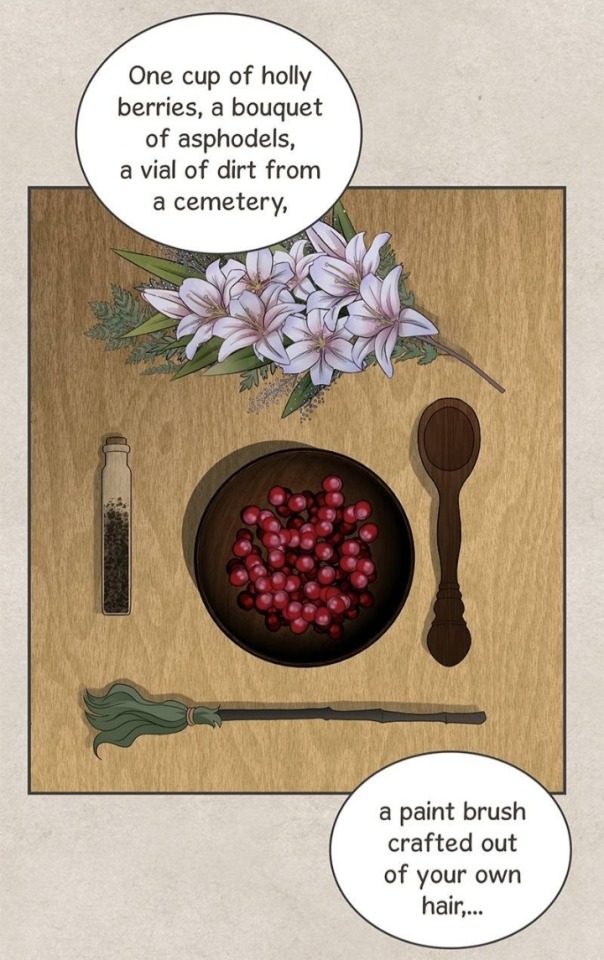
I mean, I didn't expect these ingredients, but sure. Does this imply there's a cemetery near The Pastel Kingdom? Cause Leelathae isn't allowed to be far from home, right? And I doubt she would ask someone to get dirt from cemetery for her...
I wonder what Leelathae plan was? Cause she didn't get the chance to execute it since her portrait was stolen by Leland. Or maybe she did execute it while in the Plaid Kingdom?
I agree with the witch so much. The painters fr did Leelathae dirty 💀
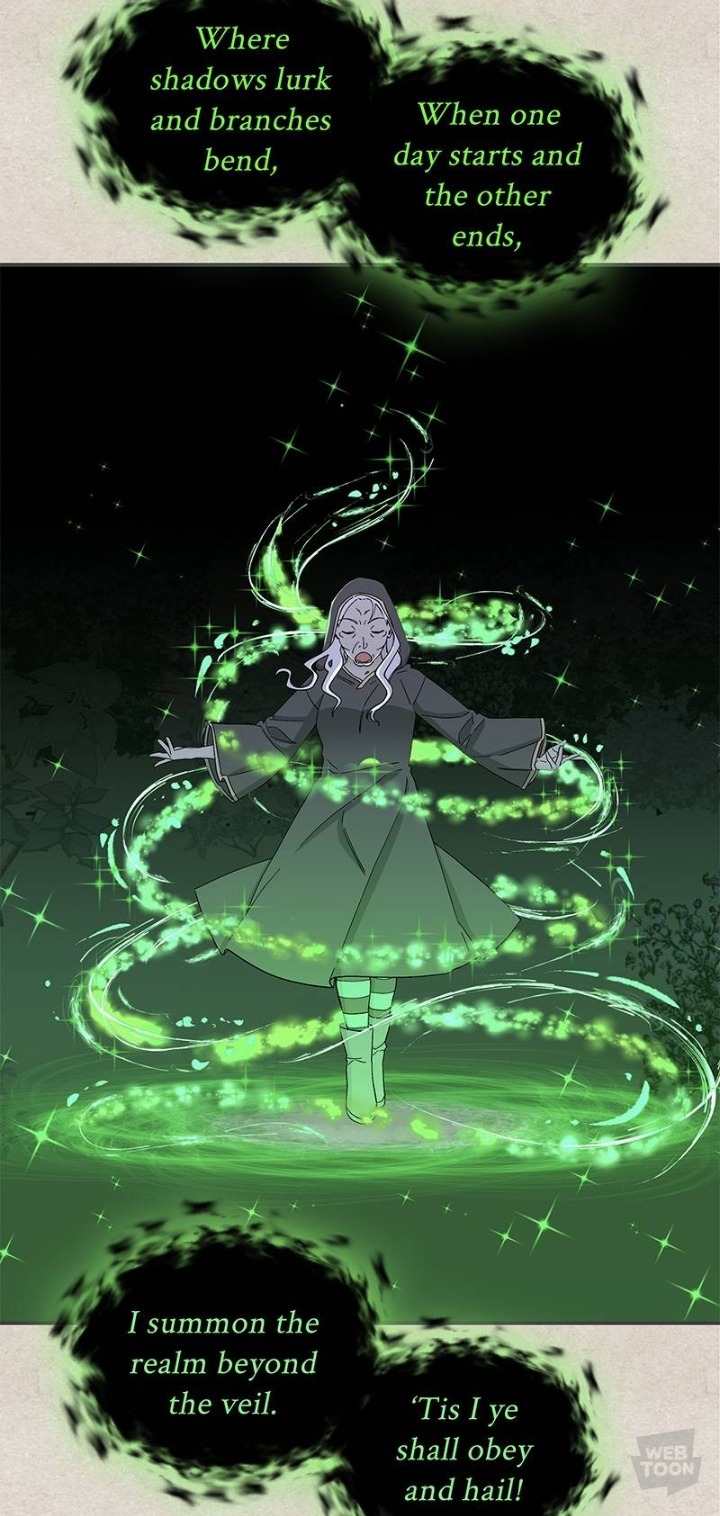
THE WITCH WASN'T LYING. SHE DOES LOOK COOL AF. LIKE. BRO?? HOW AM I NOT SUPPOSED TO FALL IN LOVE.
Huh. How does the ingredient turn into a paint-like liquid?? None of the ingredients are liquid based. Maybe the dirt?
This whole spell thing is sick man. It's so dang cool!! I wonder if anyone notices Leelathae sparkling?? I mean, one of the maids has got to notice right?
Also I've never knew there's tea inside snickerdoodles (chai is tea, right?). Well, it's not like I've ever tried snickerdoodles, but last time I read the recipe, I don't remember tea being in the recipe. But that was years ago so it might just be my memory.

Well, the mystery of the portrait is finally solved! And yet there's another mystery.. what writing did Leelathae put behind her portrait? Yes, the diary is one of them, but there are other things too. Like those brown and green papers. I'm guessing it's a message toward her kids?
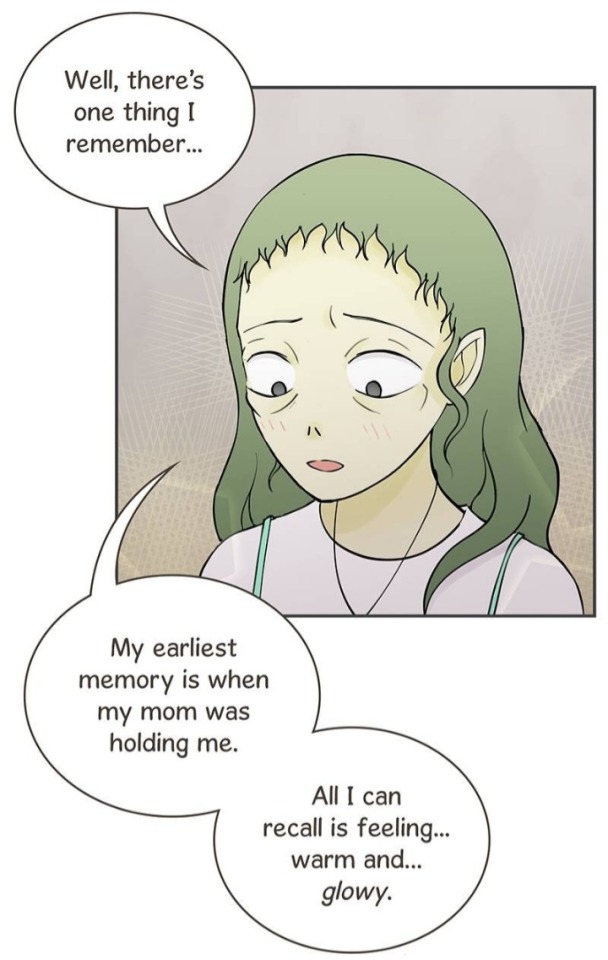
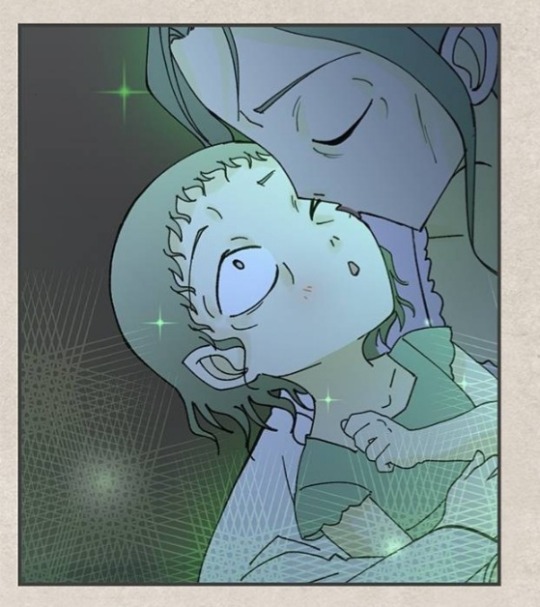
Ohh, that's why!! Leelathae was glowy because of the spell!
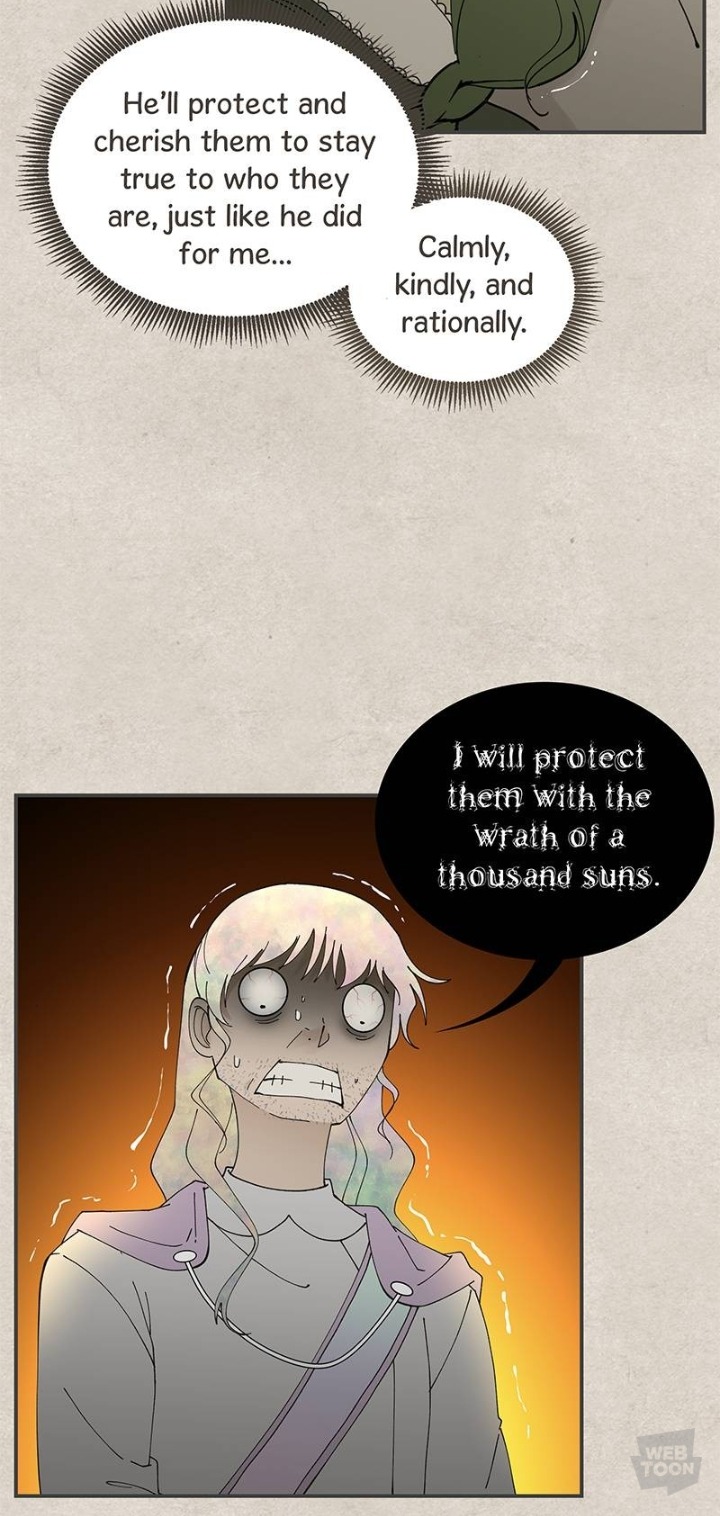
BRUH SO WAS IT LIKE, A MISUNDERSTANDING THIS WHOLE TIME?? I did kinda predict it in my really old post, but I was joking T_T
Something's kinda bothering me about what Leelathae said in her 3rd wish. Why is she only talking about her daughters? What about Jamie? Or is there a hidden meaning that I am not getting here? If someone would enlighten me, that would be nice.
Aw. It's actually pretty sweet when you think about how they didn't even know how to speak to each other at first, but they still fell in love with each other <3
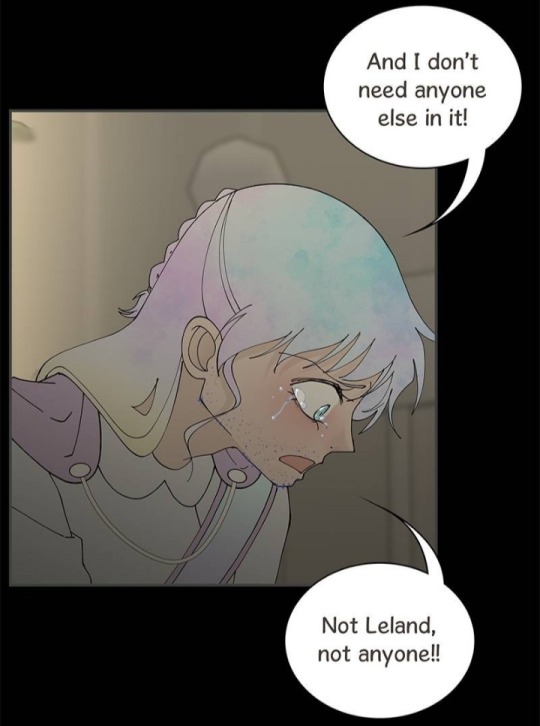
Oh. Oohhh....okay. This doesn't justify what Leland is doing right now, but it sure give a big reason for it. Yikes. Damn. That must've hurt.
Okay okay, let me just remember the past episodes to realize all the causes here.
Leland's parents died due to tragic carriage accident (didn't a carriage accident happen more than once? Tho I can't remember to who besides Leland's parents)
His best friend, Jack, didn't arrive to Leland's parents' funeral, which is the moment he needed him the most (not Jack's fault though, since he was literally stranded in an island)
Leland obviously has a little crush on Jack, which is why it hurts him when he found out Jack brought Leelathae to Pastel Kingdom (again, not Jack's fault). I think this is where he jealousy starts, the point where Leland thinks he has to be better at every love things than Jack.
He overheard Jack saying he didn't need him, which is probably the nail in the coffin for Leland. I mean that monologue Leland has? That's kinda internal mental breakdown right there. (I gotta say, this scenario is kindaaa similar to Gwen overhearing Frederick calls her ugly. I wouldn't say it's the exact same thing of course. It's just the overhearing that makes it similar)
So! Looking at these 4 reasons, it is highly likely that Leland has some problems (no shit sherlock). HEAR ME OUT. I don't know what it is yet. I was thinking of abandonment issues, but I have yet to read much about it, so i'm not sure yet.
HAH! Glad Leelathae decided to haunt his dreams tho!
OH SHIT OH SHIT. NAH LELAND NAHHHH. HE BETTER NOT. ....well at the time i'm writing this the next episode is already out so.. guess we're gonna find out...IN THE NEXT REVIEW!!
Yeah I haven't read the episode yet lol. I bet it's gonna be chaotic though.
That's it for now, until next time.
Mono out! (But still in to hear your thoughts)
27 notes
·
View notes
Text
Author Spotlight: Lee Swanson
In a follow up to our previous club read, No Man Is Her Master, the Sapphic Book Club is excited to participate in another virtual book tour for Lee Swanson. This time, we're celebrating the release of the last book in the series, She Serves the Realm. Check out the full article below to hear more about lesbians in the Middle Ages, the No Man Is Her Master series, and stay tuned to Goodreads for club member reviews.

In my historical fiction series, No Man is Her Master, the novel’s protagonist and the married Lady Cecily Baldewyne engage in a torrid illicit romance. What makes their love affair doubly dangerous is that the recipient of Lady Cecily’s affection, Christina Kohl, is another woman who leads her life in the male guise of her supposedly-dead brother, Frederick. In the soon-to-be-released fourth novel in the series, She Serves the Realm, Lady Cecily learns her husband is dead and she is at last free to wed her beloved. Consequently, according to 14th century English law, Cecily is no longer guilty of adultery. But, if the authorities discover the truth of Christina’s gender, would they punish the two lovers for the crime of homosexuality instead? Probably not. First, medieval society largely viewed sex as a penetrative act aimed at procreation. Consequently, by this interpretation sex between women was impossible because, if it was sex, one of the participants must be a man and what they were doing then did not fall under the definition of an unnatural act. Is the fact Christina and Cecily engage in lovemaking an unusual act for lesbians of the Middle Ages? Apparently not. Etienne de Fougeres, the chaplain of King Henry II of England, authored a satirical poem in 1170, Le Livre des Manières, alluding to women’s desire for sex within their own gender: These ladies have made up a game: with two bits of nonsense they make nothing; they bang coffin against coffin, without a poker stir up their fire. They don’t play at “poke in the paunch,” but join shield to shield without a lance. They have no concern for a beam in their scales, nor a handle in their mold. Out of water they fish for turbot and they have no need for a rod. They don’t bother with a pestle in their mortar nor a fulcrum for their see-saw.
Then did lesbians in the Middle Ages feel free to pleasure themselves and each other sexually without fear of legal repercussions? Seemingly so, as there are only about a dozen recorded instances of civil or ecclesiastical trials of women associated with the practice. Of these, most of the accused had ignored one of the key elements in the definition of the punishable crime of sodomy. In one of the extremely few cases prosecuted against a woman, the German imperial court sentenced Katherina Hetzeldorfer from the Rhineland town of Speyer to death in 1477 for wanting to “have her manly way” with women, some of whom testify against her. Upon examination, the defendant admitted that she used a piece of wood held between her legs and had constructed a wooden device covered with leather and stuffed with cotton to penetrate her partners. Although obviously still incapable of procreation, the good burghers of Speyer consider her acts sufficiently heinous to drown Katherina in the Rhine River for her crime. Christina hides the secret of her true gender well, as revealing herself as a woman would ruin her standing as a Hanseatic merchant and clearly perturb King Edward II who had seen fit to knight her. It’s reassuring to know what she and Cecily share in their bedchamber will probably not be the potential cause of their demise.
Lee Swanson is author of the No Man Is Her Master sapphic historical novel quadrilogy. The series concluded with She Serves the Realm, which released June 11, 2024.
#wlw books#booklr#lgbt books#book recs#sapphic books#diverse books#fantasy#she serves the realm#no man is her master#lee swanson#guest post
16 notes
·
View notes
Text


Through the Years → Queen Mary of Denmark (826/∞) 5 March 2024 | A special royal tale... It was a bit like getting the past really close, when we visited Roskilde Cathedral yesterday afternoon. The impressive cathedral covers a royal time journey of over 500 years. From the beautiful Chapel of the Holy Three Kings with impressive tombstone for Christian 3. and Frederick 2. , over Christian 4. s magnificent tomb chapel and relatively modest coffin for the Glücksborgernes Chapel, where Christian 9. and also Frederick the 8th and Christian 10. and their queens are buried . The visit was no less lively because we had Thomas Thulstrup, museum director in the Collection of Kings, with us again as a committed tour guide. Our history and culture is an important part of who we are. We can read about it and read up on it, but it is still something very special to walk around in it, as we did yesterday afternoon in the cathedral. 🖋️📸 Kongeparret.
14 notes
·
View notes
Text

Bibliography, Acknowledgements, and About the Author
Agee, James, and Walker Evans. Let Us Now Praise Famous Men. Boston: Mariner Books, 1988.
Albrecht, Gerd. Nationalsozialistische Filmpolitik: Eine soziologische Untersuchung über die Spielfilme des Dritten Reiches. Stuttgart: Ferdinand Enke, 1969.
Alter, Robert, and Frank Kermode, eds. The Literary Guide to the Bible. Cambridge, MA: Belknap Press, 1987.
Arendt, Hannah. The Origins of Totalitarianism. New York: Harcourt, 1979.
Armstrong, Karen. The Battle for God. New York: Alfred A. Knopf, 2000.
Ault, James M., Jr. Spirit and Flesh: Life in a Fundamentalist Baptist Church. New York: Alfred A. Knopf, 2004.
Barton, David. A Spiritual Heritage: Tour of the United States Capitol. Aledo, TX: WallBuilder Press, 2000.
Bartov, Omer. Mirrors of Destruction: War, Genocide, and Modern Identity. New York: Oxford University Press, 2000.
Beach, George Kimmich, ed. The Essential James Luther Adams: Selected Essays and Addresses. Boston: Skinner House Books, 1998.
Beliles, Mark A., and Stephen K. McDowell. America’s Providential History. Charlottesville, VA: Providence Foundation, 1989.
Bellant, Russ. The Coors Connection: How Coors Family Philanthropy Undermines Democratic Pluralism. Boston: South End Press, 1991.
———. Old Nazis, the New Right, and the Republican Party: Domestic Fascist Networks and Their Effect on U.S. Cold War Politics. Boston: South End Press, 1991.
Belt, Don, ed. The World Of Islam. Washington, DC: National Geographic, 2001.
Biros, Florence W. Crossing Paths Treasury. Vol. 1. New Wilmington, PA: Son-Rise Publications, 1998.
Bonhoeffer, Dietrich. Life Together: The Classic Exploration of Faith in Community. Translated by John W. Doberstein. New York: HarperCollins Publishers, 1954.
Brinton, Crane. The Anatomy of Revolution. New York: Random House, 1965.
Brown, Karen McCarthy. “Fundamentalism and the Control of Women.” In Fundamentalism and Gender. Edited by John Stratton Hawley. New York: Oxford University Press, 1994.
Burke, Theresa, and David C. Reardon. Forbidden Grief: The Unspoken Pain of Abortion. Springfield, IL: Acorn Books, 2002.
Cantor, David. The Religious Right: The Assault on Tolerance and Pluralism in America. Edited by Alan M. Schwartz. New York: Anti-Defamation League, 1994.
Carter, Jimmy. Our Endangered Values: America’s Moral Crisis. New York: Simon & Schuster, 2005.
Chrnalogar, Mary Alice. Twisted Scriptures: Breaking Free From Churches That Abuse. Grand Rapids, MI: Zondervan Publishing House, 2000.
Clarkson, Frederick. Eternal Hostility: The Struggle Between Theocracy and Democracy. Monroe, ME: Common Courage Press, 1997.
Coffin, William Sloane. The Heart Is a Little to the Left: Essays on Public Morality. Hanover, NH: University Press of New England, 1999.
Cohen, Edmund D. The Mind of the Bible Believer. Amherst, NY: Prometheus Books, 1988.
Crossan, John Dominic. Jesus: A Revolutionary Biography. New York: HarperCollins Publishers, 1994.
Crossman, Richard H., ed. The God That Failed. Chicago, IL: Regnery Gateway, Inc., 1949.
De Vries, Hentde, and Samuel Weber, eds. Religion and Media. Stanford, CA: Stanford University Press, 2001.
Diamond, Sara. Not by Politics Alone: The Enduring Influence of the Christian Right. New York: The Guilford Press, 1998.
———. Roads to Dominion: Right-Wing Movements and Political Power in the United States. New York: The Guilford Press, 1995.
——— Spiritual Warfare: The Politics of the Christian Right. Boston: South End Press, 1989.
Dobson, James. Bringing Up Boys. Wheaton, IL: Tyndale House Publishers, 2001.
——— Dare to Discipline. New York: Bantam Books, 1970.
——— Marriage Under Fire: Why We Must Win This Battle. Sisters, OR: Multnomah, 2004.
Douglass, Frederick. “What, to the Slave, Is the Fourth of July? (1852).” In Lift Every Voice: African American Oratory, 1787–1900. Edited by Philip S. Foner and Robert James Branham. Tuscaloosa: University of Alabama Press, 1998.
——— Narrative of the Life of Frederick Douglass, an American Slave, Written by Himself (1845). New York: Signet Books, 1968.
Ehrman, Bart D. The New Testament: A Historical Introduction to the Early Christian Writings. Third Edition. New York: Oxford University Press, 2004.
Fenn, Richard K. Dreams of Glory: The Sources of Apocalyptic Terror. Burlington, VT: Ashgate Publishing Company, 2006.
Frank, Thomas. What’s the Matter with Kansas: How Conservatives Won the Heart of America. New York: Henry Holt and Company, 2004.
Frazier, Gary. Signs of the Coming of Christ. Arlington, TX: Discovery Ministries, 1998.
Freud, Sigmund. Civilization and Its Discontents. Edited and translated by James Strachey. New York: W. W. Norton and Company, 1961.
Friedman, Richard Elliott. Who Wrote the Bible. New York: HarperCollins Publishers, 1989.
Gallup, George, Jr., and Jim Castelli. The People’s Religion: American Faith in the 90s. New York: Macmillan, 1989.
Ghosh, Amitav. Incendiary Circumstances: A Chronicle of the Turmoil of Our Times. New York: Houghton Mifflin Company, 2005.
Goebbels, Joseph. Signale der neuen Zeit. Munich: Eher, 1934.
Goldberg, Michelle. Kingdom Coming: The Rise of Christian Nationalism. New York: W. W. Norton and Company, 2006.
Goodrich, Chris. Faith Is a Verb: On the Home Front with Habitat for Humanity in the Campaign to Rebuild America (and the World). Brookfield, CT: Gimlet Eye Books, 2005.
Green, John C., Mark J. Rozell, and Clyde Wilcox, eds. The Christian Right in American Politics: Marching to the Millennium. Washington, DC: Georgetown University Press, 2003.
Grossman, Vasily. Life and Fate. Translated by Robert Chandler. New York: Harper and Row, 1985.
Harding, Susan Friend. The Book of Jerry Falwell: Fundamentalist Language and Politics. Princeton, NJ: Princeton University Press, 2000.
Harris, Sam. The End of Faith: Religion, Terror, and the Future of Reason. New York: W. W. Norton and Company, 2004.
Hassan, Steven. Combatting Cult Mind Control. Rochester, VT: Park Street Press, 1998.
Heinemann, Larry. Black Virgin Mountain: A Return to Vietnam. New York: Doubleday, 2005.
Hitchcock, Mark. 101 Answers to the Most Asked Questions About the End Times. Sisters, OR: Multnomah Publishers, 2001.
Hoover, Stewart M., and Lynn Schofield Clark, eds. Practicing Religion in the Age of the Media: Explorations in Media, Religion, and Culture. New York: Columbia University Press, 2002.
Horton, Ronald A., ed. Christian Education: Its Mandate and Mission. Greenville, SC: Bob Jones University Press, 1992.
Hughes, Richard T. Myths America Lives By. Urbana, IL: University of Illinois Press, 2004.
James, William. The Varieties of Religious Experience. Mineola, NY: Dover Publications, Inc., 2002.
Jenkins, Jerry B., Tim LaHaye, with Chris Faby. The Rise of False Messiahs: Left Behind: The Kids. Wheaton, IL: Tyndale Press, 2004.
Juergensmeyer, Mark. Terror in the Mind of God: The Global Rise of Religious Violence. Third Edition. Los Angeles: University of California Press, 2003.
Kaplan, Esther. With God on Their Side: How Christian Fundamentalists Trampled Science, Policy, and Democracy in George W. Bush’s White House. New York: New Press, 2004.
Kennedy, D. James. Evangelism Explosion. Fourth Edition. Wheaton, IL: Tyndale House Publishers, 1996.
Kennedy, D. James, and Jim Nelson Black. Character and Destiny: A Nation in Search of Its Soul. Grand Rapids, MI: Zondervan Publishing, 1994.
Kennedy, D. James, with Jerry Newcombe. The Gates of Hell Shall Not Prevail. Nashville, TN: Thomas Nelson Publishers, 1996.
———. Lord of All: Developing a Christian World-and-Life View. Wheaton, IL: Crossway Books, 2005.
———. What If America Were a Christian Nation Again? Nashville, TN: Thomas Nelson Publishers, 2003.
Kepel, Gilles. The War for Muslim Minds: Islam and the West. Cambridge, MA: Belknap Press, 2004.
Kintz, Linda, and Julia Lesage, eds. Media, Culture, and the Religious Right. Minneapolis: University of Minnesota Press, 1998.
Klemperer, Victor. I Will Bear Witness 1933–1941: A Diary of the Nazi Years. Translated by Martin Chalmers. New York: Modern Library, 1999.
———. I Will Bear Witness 1942–1945: A Diary of the Nazi Years. Translated by Martin Chalmers. New York: The Modern Library, 1999.
Koonz, Claudia. The Nazi Conscience. Cambridge, MA: Belknap Press, 2003.
Kugel, James L. The Bible As It Was. Cambridge, MA: Belknap Press, 1997.
LaHaye, Tim, with Steve Halliday. The Merciful God of Prophecy: His Loving Plan for You in the End Times. New York: Warner Faith, 2002.
LaHaye, Tim, and Ed Hindson. The Popular Bible Prophecy Workbook. Eugene, OR: Harvest House Publishers, 1982.
LaHaye, Tim, and Thomas Ice. Charting the End Times. Eugene, OR: Harvest House Publishers, 2001.
LaHaye, Tim, and Jerry B. Jenkins. Apollyon: The Destroyer Is Unleashed. Wheaton, IL: Tyndale House Publishers, 1999.
———. Armageddon: The Cosmic Battle of the Ages. Wheaton, IL: Tyndale House Publishers, 2003.
———. Assassins: Assignment: Jerusalem, Target: Antichrist. Wheaton, IL: Tyndale House Publishers, 1999.
———. Desecration: Antichrist Takes the Throne. Wheaton, IL: Tyndale House Publishers, 2001.
———. Glorious Appearing: The End of Days. Wheaton, IL: Tyndale House Publishers, 2004.
———. The Indwelling: The Beast Takes Possession. Wheaton, IL: Tyndale House Publishers, 2000.
———. Left Behind: A Novel of the Earth’s Last Days. Wheaton, IL: Tyndale House Publishers, 1995.
———. The Mark: The Beast Rules the World. Wheaton, IL: Tyndale House Publishers, 2000.
———. Nicolae: The Rise of Antichrist. Wheaton, IL: Tyndale House Publishers, 1997.
———. Remnant: On the Brink of Armageddon. Wheaton, IL: Tyndale House Publishers, 2002.
———. Soul Harvest: The World Takes Sides. Wheaton, IL: Tyndale House Publishers, 1998.
———. Tribulation Force: The Continuing Drama of Those Left Behind. Wheaton, IL: Tyndale House Publishers, 1996.
Lakoff, Mark. Moral Politics: How Liberals and Conservatives Think. Second Edition. Chicago: University of Chicago Press, 2002.
Larson, Edward J. Summer for the Gods: The Scopes Trial and America’s Continuing Debate over Science and Religion. Cambridge, MA: Harvard University Press, 1997.
Leonard, Bill J. Baptists in America. New York: Columbia University Press, 2005.
Lewis, Sinclair. It Can’t Happen Here. New York: Penguin Books, 1963.
Lifton, Robert Jay. Thought Reform and the Psychology of Totalism: A Study of Brainwashing in China. New York: W. W. Norton and Company, 1961.
Loehr, Davidson. America, Fascism and God: Sermons from a Heretical Preacher. White River Junction, VT: Chelsea Green Publishing Company, 2005.
Maharidge, Dale, with photographs by Michael Williamson. And Their Children After Them: The Legacy of Let Us Now Praise Famous Men: James Agee, Walker Evans, and the Rise and Fall of Cotton in the South. New York: Seven Stories Press, 2004.
———. Denison, Iowa: Searching for the Soul of America Through the Secrets of A Midwest Town. New York: Free Press, 2005.
———. Homeland. New York: Seven Stories Press, 2004.
———. Journey to Nowhere: The Saga of the New Underclass. New York: Hyperion, 1996.
Maimon, Solomon. Solomon Maimon: An Autobiography. Translated by J. Clark Murray. Urbana: University of Illinois Press, 2001.
Manseau, Peter. Vows: The Story of a Priest, a Nun, and Their Son. New York: Free Press, 2005.
Martin, William. With God on Our Side: The Rise of the Religious Right in America. New York: Broadway Books, 1996.
Marty, Martin E., and R. Scott Appleby. The Glory and the Power: The Fundamentalist Challenge to the Modern World. Boston: Beacon Press, 1992.
———. The Fundamentalism Project. 5 vols. Chicago: University of Chicago Press, 1991–95.
McGirr, Lisa. Suburban Warriors: The Origins of the New American Right. Princeton, NJ: Princeton University Press, 2001.
Meerloo, Joost A. M. The Rape of the Mind: The Psychology of Thought Control, Menticide, and Brainwashing. Cleveland and New York: The World Publishing Company, 1956.
Mendelssohn, Moses. Jerusalem: Or On Religious Power and Judaism. Translated by Allan Arkush. Introduction and Commentary by Alexander Altmann. Lebanon, NH: University Press of New England, 1983.
Niebuhr, Reinhold. The Irony of American History. New York: Charles Scribner’s Sons, 1952.
Niebuhr, Reinhold. Justice and Mercy. Edited by Ursula M. Niebuhr. New York: Harper & Row, 1974.
Nock, A. D. Conversion: The Old and the New in Religion from Alexander the Great to Augustine of Hippo. Baltimore, MD: The Johns Hopkins University Press, 1998.
O’Leary, Stephen D. Arguing the Apocalypse: A Theory of Millennial Rhetoric. New York: Oxford University Press, 1994.
Ortega y Gasset, José. The Revolt of the Masses. Translated by Anthony Kerrigan. Edited by Kenneth Moore. Notre Dame, IN: University of Notre Dame Press, 1985.
Orwell, George. 1984. New York: Harcourt Brace Jovanovich, 1977.
Palmer, Laura. Shrapnel in the Heart: Letters and Remembrances from the Vietnam Veterans Memorial. New York: Random House, 1987.
Paxton, Robert O. The Anatomy of Fascism. New York: Alfred A. Knopf, 2004.
Phillips, Kevin. American Dynasty: Aristocracy, Fortune, and the Politics of Deceit in the House of Bush. New York: Penguin Group, 2004.
Popper, Karl. R. The Open Society and Its Enemies: The Spell of Plato. Princeton: Princeton University Press, 1966.
Postman, Neil. Amusing Ourselves to Death: Public Discourse in the Age of Show Business. New York: Penguin Books, 1986.
Press, Bill. How the Republicans Stole Christmas: The Republican Party’s Declared Monopoly on Religion and What Democrats Can Do to Take It Back. New York: Doubleday, 2005.
Prothero, Stephen. American Jesus: How the Son of God Became a National Icon. New York: Farrar, Straus and Giroux, 1985.
Riley, Naomi Schaefer. God on the Quad: How Religious Colleges and the Missionary Generation Are Changing America. New York: St. Martin’s Press, 2005.
Robertson, Pat. The New World Order. Dallas: Word Publishing, 1991.
Rossing, Barbara R. The Rapture Exposed: The Message of Hope in the Book of Revelation. New York: Basic Books, 2004.
Rushdoony, Rousas John. The Institutes of Biblical Law. Dallas, TX: The Craig Press, 1973.
Saloma, John S., III. Ominous Politics: The New Conservative Labyrinth. New York: Hill and Wang, 1984.
Sargant, William. Battle for the Mind: A Physiology of Conversion and Brain-Washing. Cambridge, MA: ISHK, 1997.
Singer, Margaret Thaler. Cults in Our Midst: The Continuing Fight Against Their Hidden Menace. San Francisco: Jossey-Bass, 2003.
Smith, Christian. Christian America?: What Evangelicals Really Want. Los Angeles: University of California Press, 2000.
Smith, Chuck. Calvary Chapel Distinctives. Costa Mesa, CA: The Word for Today Publishers, 2004.
Smith, Wilfred Cantwell. What Is Scripture: A Comparative Approach. Minneapolis, MN: Fortress Press, 1993.
Spong, John Shelby. Rescuing the Bible from Fundamentalism: A Bishop Rethinks the Meaning of Scripture. New York: HarperCollins Publishers, 1991.
Stein, Stephen J. The Encyclopedia of Apocalypticism, Vol. 3. Apocalypticism in the Modern Period and the Contemporary Age. New York: Continuum, 1999.
Stern, Fritz. The Politics of Cultural Despair: A Study in the Rise of the Germanic Ideology. Berkeley: University of California Press, 1989.
Stern, Jessica. The Ultimate Terrorists. Cambridge, MA: Harvard University Press, 1999.
Strozier, Charles B. Apocalypse: On the Psychology of Fundamentalism in America. Eugene, OR: Wipf and Stock Publishers, 2002.
Theweleit, Klaus. Male Fantasies, Vol. 1. Women, Floods, Bodies, History. Translated by Stephen Conway. Minneapolis: University of Minnesota Press, 1987.
———. Male Fantasies, Vol. 2. Male Bodies: Psychoanalyzing the White Terror. Translated by Erica Carter and Chris Turner. Minneapolis: University of Minnesota Press, 1989.
Tillich, Paul. The Shaking of the Foundations. New York: Charles Scribner’s Sons, 1948.
Todorov, Tzvetan. The Conquest of America. New York: HarperCollins, 1992.
———. Facing the Extreme: Moral Life in the Concentration Camps. Translated by Arthur Denner and Abigail Pollak. New York: Henry Holt and Company, 1997.
———. Hope and Mercy: Lessons from the Twentieth Century. Translated by David Bellos. Princeton, NJ: Princeton University Press, 2003.
Twain, Mark. The Adventures of Huckleberry Finn. New York: Charles L. Webster and Company, 1885.
Wallis, Jim. God’s Politics: Why the Right Gets It Wrong and the Left Doesn’t Get It. New York: HarperCollins Publishers, 2005.
Whitcomb, John C., and Henry M. Morris. The Genesis Flood: The Biblical Record and Its Scientific Implications. Phillipsburg, NJ: P & R Publishing, 1960.
White, Mel. Stranger at the Gate: To Be Gay and Christian in America. New York: Plume, 1995.
Wills, Garry. Under God: Religion and American Politics. New York: Simon & Schuster, 1990.
Winn, Denise. The Manipulated Mind: Brainwashing, Conditioning and Indoctrination. Cambridge, MA: Malor Books, 2000.
Wolfe, Alan. The Transformation of American Religion: How We Actually Live Our Faith. New York: Free Press, 2003.
Wright, Stuart A., ed. Armageddon in Waco: Critical Perspectives of the Branch Davidian Conflict. Chicago: University of Chicago Press, 1995.
Acknowledgments
This book was written with the generous and unstinting support of the Nation Institute, which allowed me to work unfettered for many months on this project. I am deeply grateful for this support and encouragement, especially that of Hamilton Fish, Taya Grobow, Janine Jaquet and Jonathan Schell, as well as Peggy Suttle and Katerina vanden Heuvel at magazine. I also owe a huge debt to Princeton University, where I teach in the Program in American Studies. R. Sean Wilentz and Judith S. Ferszt, as well as C. K. “Charlie” Williams, Elaine Pagels, Sam and Liz Hynes, and many of my dedicated and brilliant students always lent encouragement and advice. I am blessed with supportive and thoughtful friends and colleagues.
Pamela Diamond, for the second time, oversaw the research and organization of a book of mine with her usual skill, patience, dedication and good humor. I cannot imagine having to go through this without her. Rebecca Beyer, a talented reporter and writer, worked extensively on the book, carrying out some interviews and attending events. She was a close and valued collaborator. Elyse Graham and Amy Paeth, two of my students at Princeton, did tremendous and important research, especially under heavy time pressure in the closing days of production. Timothy Nunan, another Princeton student, did a fine job documenting creationist attacks on Charles Darwin and evolution. I benefited greatly from his research. Lisa Winn, Lauren Brown, James Arnold, Maria Guerrero-Reyes, Linda Kane, Kate Peters, Jason Proske, Colin Maier, Moya Quinlan-Walshe and Kathryn Tippett constituted our small army of transcribers. I turned over hours of tape to them and relied on their care and dedication to produce the transcripts. I owe a tremendous debt to those few who have been among the first to investigate and explain dominionism. They include Katherine Yurica, who produces the available online; Frederick Clarkson, whose three-part series in PublicEye.org in March/June 1994 called “Christian Reconstructionism” was a groundbreaking piece of journalism and who continues to do important research into the movement; and Sarah Diamond, whose books, such as are indispensable.
I owe thanks for vital help and support from Bernard Rapoport and Paul Lewis, as well as Patrick Lannan, Ralph Nader, Jenny Ford, Joan Bokaer, Mariah Blake, Cristina Nehring, Ann and Walter Pincus, Lauren B. Davis, June Ballinger, Michael Goldstein, Anne Marie Macari, Robert J. Lifton, Richard Fenn, Fritz Stern, Robert O. Paxton, Charles B. Strozier, Irene Brown, Joe Sacco, Al Ross, the Reverend Mel White, the Reverend Davidson Loehr, the Reverend Ed Bacon, Bishop Krister Stendhal, the Reverend William Sloane Coffin, the Reverend Joe Hough, the Reverend Michael Granzen and the Reverend Terry Burke. The Reverend Coleman Brown, as he has done with all my books, read and critiqued each chapter. Coleman again let me rely on his profound insight and wisdom. As usual, he raised questions and offered critiques that often forced me to reconsider my position or go back to my research. Max Blumenthal, a friend and fine reporter, nursed me through much of this with sage help and advice. I would like to thank Marji Mendelsohn and Janice Weiss for guidance and research, as well as Tamar Gordon, whose advice and scholarship helped me head in the right direction. Tom Artin, as talented a jazz musician as he is a scholar and writer, went through every chapter, as did my wife, Kim Hedges, who always saves me from being too sententious and ponderous with the stroke of her red pen, her gentle smile and common sense. Barbara Moses, the gifted painter, again came to our aid with her amazing eye for detail and her iron command of grammar.
I often leaned for emotional support on my friend John “Rick” MacArthur, who keeps alive magazine, one of the great intellectual journals in America, as well as my friend the poet Gerald Stern, who appeared frequently as I was writing to drag me into the sunlight for lunch and impart needed encouragement.
My editors at Free Press, especially Dominick Anfuso and Wylie O’Sullivan, patiently edited, shaped and formed the text. I would also like to thank Michele Jacob. Lisa Bankoff of International Creative Management held my hand, for the fourth time, through this process of proposal to contract to delivery. She is a gift.
About the Author
Chris Hedges, a graduate of Harvard Divinity School, was a foreign correspondent for nearly 20 years. He was the bureau chief in the Middle East and the Balkans, and worked in other foreign posts, for The New York Times from 1990 to 2005. He worked previously for The Dallas Morning News, National Public Radio and The Christian Science Monitor in Latin America and the Middle East. He has reported from more than 50 countries. Hedges was a member of the New York Times team that won the 2002 Pulitzer Prize for Explanatory Reporting for the paper’s coverage of global terrorism, and he received the 2002 Amnesty International Global Award for Human Rights Journalism. He holds a B.A. in English Literature from Colgate University and a Master of Divinity from Harvard Divinity School. Hedges has taught at Columbia University, New York University and Princeton University, where he is currently a Visiting Lecturer in the Council of the Humanities and the Program in American Studies as well as the Anschutz Distinguished Fellow. He has written for Foreign Affairs, Granta, Harper’s, Mother Jones and The New York Review of Books. Hedges is the author of War Is a Force That Gives Us Meaning—a finalist for the National Book Critics Circle Award for Nonfiction. His other books are What Every Person Should Know About War and Losing Moses on the Freeway: The 10 Commandments in America. He lives in New Jersey.
#christianity#fascism#right-wing#us politics#xtians#United States of America#christians#anarchism#anarchy#anarchist society#practical anarchy#practical anarchism#resistance#autonomy#revolution#communism#anti capitalist#anti capitalism#late stage capitalism#daily posts#libraries#leftism#social issues#anarchy works#anarchist library#survival#freedom
3 notes
·
View notes
Text
Empress Mary laid to rest in State Funeral


Her Imperial Majesty The Dowager Empress was laid to rest today in a beautiful Full State Funeral. Her Late Imperial Majesty has laid in state in St. Anne's Cathedral in St. Thomas Palace since her passing last week. Thousands have turned out to pay their respects to their beloved Empress. The Palace expecting a large turn out had warming areas for the people to stay warm and regularly passed out coffee, tea or hot chocolate. His Imperial Majesty The High King stated that he and the rest of the Imperial Family are touched by the outpouring of grief and condolences coming in. HIM stated "I knew Mama was well loved by the people but seeing how much has been touching."
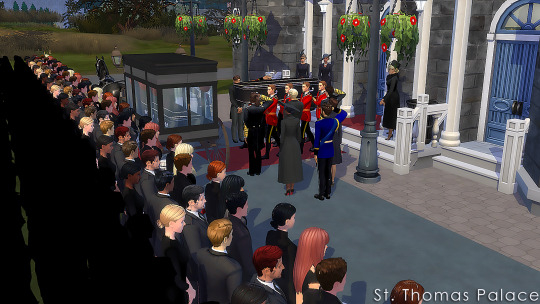

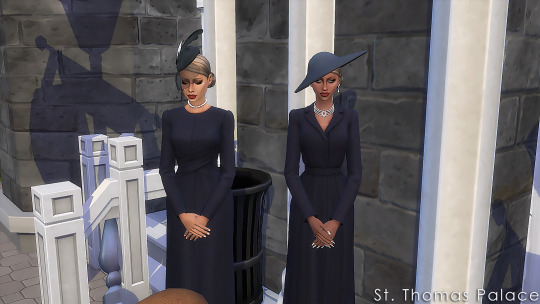
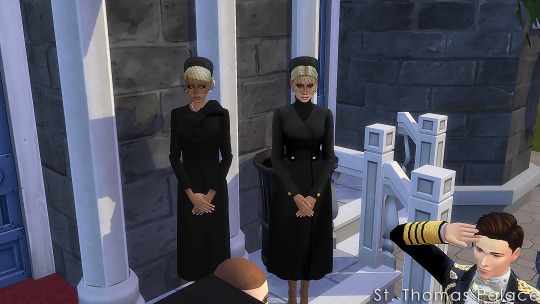

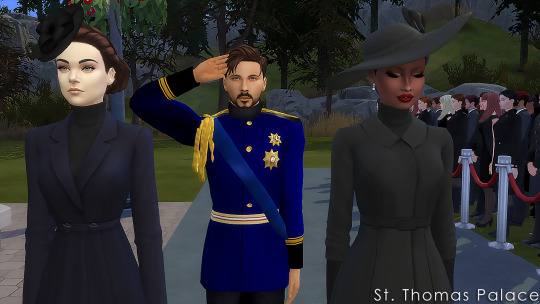
The Imperial Family stood in honor with Family Members of the Military in dress uniforms saluting Her Imperial Majesty's coffin as it passed by them. Many people were shocked to see Lady Alexandra among the family but a source with in the palace stated "I'm not surprised to see Lady Alexandra among the Imperial Family, she practically grew up in the palace and was greatly loved by the Dowager Empress. When The Prince of Avalon announced to the family his intention to ask Lady Alexandra out on a date, the Dowager Empress and High Queen were thrilled. There is a lot going on behind the scenes and I think the Dowager Empress and High Queen had (have) taken Lady Alexandra under their wings in hopes that she and The Prince of Avalon will marry in the future. Also among the Family gathered were Their Majesties King Frederick and Queen Elenore of Elthonia. Their Majesties have always been close to the family and wanted to be in attendance in support of the Caledonyian Imperial Family.
In attendance was His Imperial Majesty High King Richard III & I, Her Imperial Majesty High Queen Aurora, Her Imperial Highness The Princess Imperial, His Imperial Highness The Prince of Avalon, His Imperial Highness The Prince Nicholas, His Imperial Highness Prince George The Duke of Snowport (brother in law of The Dowager Empress), His Royal Highness The Earl of Hereford, Her Royal Highness The Countess of Hereford and from Alexandria His Imperial Majesty High King Nathaniel VII & I and Her Imperial Majesty High Queen Regina
@thealexandrianroyals @miyuzarry
#sims 4 royal family#sims 4 royal legacy#the sims 4 monarchy#sims 4 simblr#sims 4#chapter2#the sims 4#stthomaspalace#the sims 4 royal#ts4 royal simblr
12 notes
·
View notes
Text

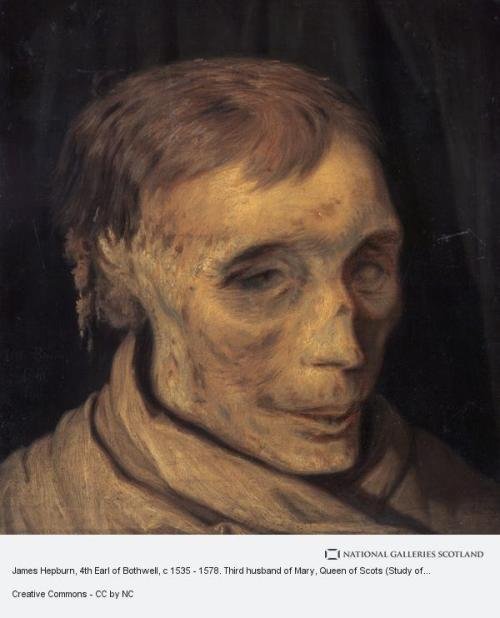



On April 14th 1578 James Hepburn, 4th Earl of Bothwell , Earl of Orkney and third husband of Mary Queen of Scots died, aged 44, tied to a post in a dungeon at, Denmark.
As I posted on Friday Bothwell fled Scotland after the surrender at Carberry Hill, Queen Mary’s last act of love for him was guaranteeing he could leave the area unharmed.
Bothwell took ship from Aberdeen to Shetland, he may have stopped off in Orkney, the only thing we know is he was denied refuge there and travelled on to Shetland.
He was pursued by Sir William Kirkcaldy of Grange and William Murray of Tullibardine who it seems were not that far behind him. They sailed into Bressay Sound near Lerwick. Four of Bothwell’s ships in the Sound set sail north to Unst where Hepburn and his cousin, the pirate, Olaf Sinclair were negotiating with German captains to hire more ships. Kirkcaldy’s flagship The Lion, chased one of Bothwell’s ships, and both ships were damaged on a submerged rock.
Bothwell sent his treasure ship to Scalloway and fought a three-hour-long sea battle off the Port of Unst where the mast of one of his ships was shot away. During the chase a storm erupted and Bothwell’s superior seamanship to come to his rescue. After transferring his men to his two remaining ships, he sailed south-east before the wind, making the 250-mile crossing in record time Although Kirkcaldy followed for sixty miles, he was out-sailed and, by his own admission, was ‘no good seaman’.
He might have thought he was off the hook again, but no, Frederick II was not sympathetic to his cause, he was at war, and was torn between his blood ties to Mary Queen of Scots and the need to show loyalty to his Protestant allies. Fortunately for him, the problem solved itself when Mary, held prisoner in England, dissolved her marriage to Bothwell, making him merely a problem to be got rid of from Frederik’s perspective, so he ordered his arrest to be used as a bargaining chip in the forlorn hope that he would be traded in return for the return of the Northern Isle!
After being brought before the Bergen magistrates, in September he was carried to Copenhagen on one of Frederick’s ships for ‘honourable confinement’ at Dragshorn Castle, the Scandinavian equivalent of the Tower Of London. I found an extract from My Heart is My Own, a biography on Mary Queen of Scots that reads
“On 14th April 1578, Bothwell died at Dragsholm. As was customary for state prisoners, his body was carried to the promontory that juts into the fjord a side of things. mile or so from the castle and buried at the parish church of Fårevejle. (…) “
There are differing versions on how he lived out his last days, one says he was actually not held in ‘honourable confinement’, but in a small dungeon chained to a post, the cell so small he was unable to stand, the second is more in the line of the ‘honourable confinement’ that he spent the last years drinking to excess with others held at the castle and gradually became more and more insane.
John Maxwell, visited Dragshorn Castle, and reported that Hepburn had latterly become overgrown with hair and filth. I take it from this he was still alive at the time!
The story doesn’t quite end there, Bothwell’s coffin was opened for the first time in 1868 and a very well-preserved body was found, which subsequently rapidly decayed and, for a period of time, until 1973, was open to public viewing under a glass lid. Then, in response to a request from the descendants of the Hepburn family, the newly-crowned Margrethe II had Bothwell buried in a zinc-lined coffin within a sarcophagus of oak, and here he remains.
Every now and then there is a story in the press about his descendents making an attempt for his body to be repatriated, I have no idea why the Danes would not allow this and for the moment he remains there. Of course with a story like this the castle is said to be haunted by the "good” Earl, where is he said to ride through the courtyard with a full horse and carriage.
The pictures are, the supposed head of Bothwell “ Study of Mummified Head” by Danish artist Otto Bache. The even more gruesome “body of James Hepburn” although the church where his supposed remains lie was known to have exhibited several bodies over the years as his, therefore, it is impossible to know if this is actually him.
There have been moves by his descendants to have his body repatriated through the years Speaking in 2010 Sir Alastair Buchan-Hepburn, Bothwell's direct descendant sought to raise funds to lobby the Scottish and Danish governments, saying "I want the Scottish culture minister to get in touch with his Danish counterpart to ask him 'would you please consider to return the body of James Hepburn, the Earl of Bothwell?'"
James Hepburn, 4th Earl of Bothwells’ remains are now kept in the crypt at the church at Faravejle, near Dragsholm Castle, as seen in the last pic.
7 notes
·
View notes
Text
Leland, the Chessmaster (CPC wiki)
I make this post to make sense over Leland, the main antagonist of the CPC story that cleverly written by LambCat to not make us not aware how horrendous bad he is until the end of season 4 part 1 (the gala fiasco 'not so nice' plan) and cuz... Ughhh I am not that good at chess game so...
basically calling out @cpcwiki for maybe intake 'bout him
I want to expand his personality section on his page, we're lacking informations but I feel a simple sentence from wiki could be expanded more (feel free to reblog, gives reply etc about this post! That'll immensely helpful to anyone espc to me as wiki editor - the one that bad at chess as always lose on simple early rounds to my friend hahahah)
Personality
Leland is a mercurial figure. With his sons, especially his youngest, he is generally harsh and overbearing, although he seems to genuinely consider this as "training for the harsh realities of life". This behavior extends from the relatively innocuous habit of forcing his sons to perform push-ups at the merest hint of failure to implied murder[2]. Much of Leland’s actions and behavior, especially towards his wife and sons, are abusive. -> S4 part 2 makes us learns how abusive it's actually is, it's very subtle yet frighteningly so scary - it could happened to anyone IRL and the worse thing is the victims not notice until too late. In nutshell, the mother (Isolde) ripped from her own sons since baby so the Plaid Princes trained as "the royal way" (implied to groomed them up so each prince matching personality of each princess) - this makes the princes to never realizes what's actually a motherly love is in their childhood that makes each of the son believes that their lives solely depends on what's their father (the Plaid King) wants [Lance mentioned that at, ep 156 iirc?] and that's make them suffers in their own respective way: Blaine soughts to perfection as the eldest golden child that constantly on the edge and believes to should climbing to the 'top of the mountain'. Lance as the middle child believes that the only way he could do is supporting his team which is do what Leland wants. Frederick the youngest as the effect of his accumulation of 'misfortunes' (born small, can't do like what Leland wants designing him to be, etc) deemed as the black sheep/scapegoat of the family. That's totally messed up and I could gladly to explain more but we're in summary
Lance canonical quote, uhh ep 156 likely! This the nail of the coffin that Leland truly abusing his own family and Lance know about it - but until invasion arc kinda brushed it off
"He controls everything about us. And everything always goes his way" -> if that quote isn't scary, idk what else
Despite this attitude, he seems affectionate of them, and wishes to see them happy. He is noticeably more lenient in terms of restrictions than his best friend, King Jack of the Pastel Kingdom, with whom Leland has an apparently close bond. -> this make entire of very confusing and ambiguous relationships between Leland - and literally everyone espc Jack (his BFF, but messed up in the fandom as becomes a ship 'JaLand' hahaha). I won't talk about it more as it should go on the relationship descriptions, something that me as someone that not as emphatetic will have hard time to relate
+ my biggest question on this paragraph, what's and who "them" refer? The previous paragraph where just writes the very concerning sentence about 'he abuses his family'? WTF. Who kind of abuser that wants the victim to be 'happy' where they are literally the reason of the victims to be unhappy?
That paragraph need to change but for now I am not sure, maybe starts with clear reference of which 'them' refers to. I blame whoever that writes that first sentence but if one thing that I hate is to checking this page to search someone to blame, because at the end it doesn't matter. The current wiki only has 3 active editors and whoever originally writes it prob gone inactive (?) - and I am waiting for a certain episode to be free so I could tell certain plot point to flesh out his personality as that particular episode is the main crusher and enforcer about a popular fandom question "Does Leland thinks Leelathae | Lilyth and by extension Gwen, beautiful?"
Once that ep free maybe the personality part of him could be added in following suit. Also maybe adding characters to be relate to him, priority is the Pastel Queen cuz they're meet
and uh the current relationship description need to changes espc from his own quotes throughout his interactions
-> Laverne (help me, in words what it means?)
"Nothing's too decadent for my queens. After all, we're going to be the most prosperous kingdom in the world soon."
-> Maria and Lorena (help me, in words what it means?)
"So I'll offer you once more, princesses.... Leave your treacherous and insufferable father. Join me and my sons peacefully, and you have all the freedom, privileges, and power you could ever imagine. ...What do you say?"
"Fine, then you can rot in dungeons forever with your father after the wedding is done. "
-> the CPC, espc Whitney (the embodiment of abused victim)
"I think it's a compassionate solution. Any strong leader knows that a kingdom needs healthy, productive, citizens who can contribute safely to society. I mean, the people with curses hide themselves away because they know it too. They're of no value until they can be fixed." / the CPC
"Hm... I dunno, Blaine... I think he has a point. During dinner, I was keeping an eye on you boys. And while you were fumbling through your important gala speech and losing drinking games to school girls, Frederick stopped a rogue pet bird from crashing into a champagne glass tower by catching it one-handed. He saved the dinner. I was impressed. I think you might need to watch out for our little Frederick. He's on his way up." -> Whitney's that quickly follow up with the tiger/catboi realization that the whole ordeal is very similar with his family, the Monochrome
"This sort of reminds me of my own family before I left..."
/idk how to summarizes his personality in a words, but the hints there... Whoever in CPC BLR please help us at wiki

Leland has a fondness for chess, a passion he shares with King Jack. -> this the original main reason I make this post
So uhh I am not remember the exact episodes, but he clearly loves chess as: at the amusement park arc he played with Jack while pastel-plaid kids go to the town, when Fred didn't come back in time and his brothers wondering about his whereabouts - in his hand he has chess-related book, and at the gala basically he has round of chess game which he wins with the move of - the serpent's gambit

^ Leland explains his "Serpent's Gambit". The biggest foreshadowing imho that the Giant Serpent of Frederick's recurring dream is 99.99% likely to be Leland as his own father. The Plaid King that canonically at the episode 133 depict real people of his world as chess pieces by creepily crafting characteristics of them - the hair, the color motif, even the thread between Jack and the late Leelathae
Here more about the referenced move, Great Snake Variation as the one that likely refers to 'Serpent's Gambit' actually is
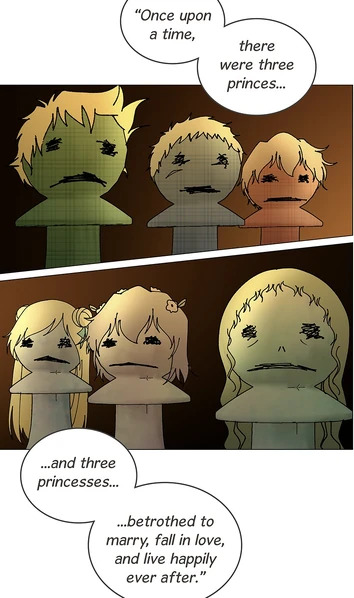
^ this an image that I upload long ago but not sure to put where at wiki, and I just FORGOR although I keep analyzing and referencing it intensely on various cpc posts that I made
In nutshell, this panel shown that Leland consider the people of his plan (Blaine, Maria, Lance, Lorena, Frederick, Gwen, Jack, Leelathae | Lilyth) as his chess pieces. For his years grand plan [explanation after this] - and in that chess game, he forgot/not aware to consider important variables that wrecks his plan somehow: Isolde (his 'wife' and the Plaid queen), Jamie (Gwen's twin brother as the first genuine shipper of gwenderick), and the CPC as the entirety. The first two, Jamie and Isolde + Leopold unexpectedly became important reason for the major 'chess piece' Frederick to breaks free from his plan which to make Fred stucks at the hole 'until the Plaid troops come back to bringing the kidnapped Pastel Princesses'. The 'chess piece' that warns the role of supporter in the CPC story, the CPC itself as entirety to hurry saves the princesses of the Pastel Kingdom
more about interpretation of messed up chess pieces
All of the 'pawns' involved not aware that they are merely pawn pieces in his plan. The quote on that panel in my own retake honestly tragic. Leland with his fickleness of his heart's sky not truly understand what love, what true love is actually... He thoughts that love is simply meeting someone on the opposite gender (if his HC being repressed gay is the truth, so he try to make heterosexual pairings as WARNING FOR MINOR FP EP 162 SPOILER When Jack happy for the incoming playdates of their future 'daughters', Leland instantly tells that he will get lots of sons) of three princes as his sons bethroted to marry Jack's daughters of the rule of three (somehow - that likely making the plaid-pastel pairings has bonding interest, the oldest is music-the middle is army and sports- the youngest books) fall in love and 'live happily ever after' but like Prez said, no one can't define what's own happiness is except oneself... Prez is happy to be aroace, Gwen is happy to could be with Frederick romantically - and that's totally valid source of happiness.. no one can't say otherwise, not even themself
"It's easy to forget once we step outside this forest, but we each define our own standards. And for me, I don't want to be a good princess and settle down with anyone. I never have...!!" -> that's my own interpretation of Prez quote, she's canonically aroace but know that the standard - of happiness.. it's defined by oneself
A character to me depicted by themself (espc from their actions and inner thoughts) and by others (as relationships to anyone they're interact, their family - friends - collagues etc). And Leland is truly a very complex character to cipher, to put his description on the wiki. I am afraid as I might be too subjective if writing about him... and I think I desperately need another's opinion + this an OPEN CHALLENGE to delegate the impossible wiki works, with writing about Leland from the canon hints that I spread on. Just rereading the CPC guys, you become horrified when knowing the context of Leland's abuse that actually clear since ep 16!
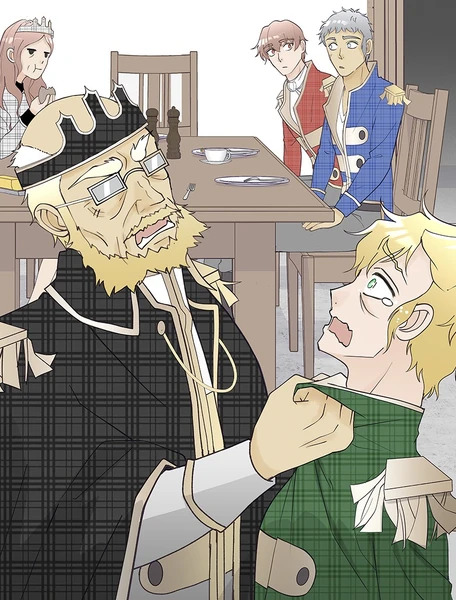
/ adios while leaving the scare bomb.. of the truths
9 notes
·
View notes